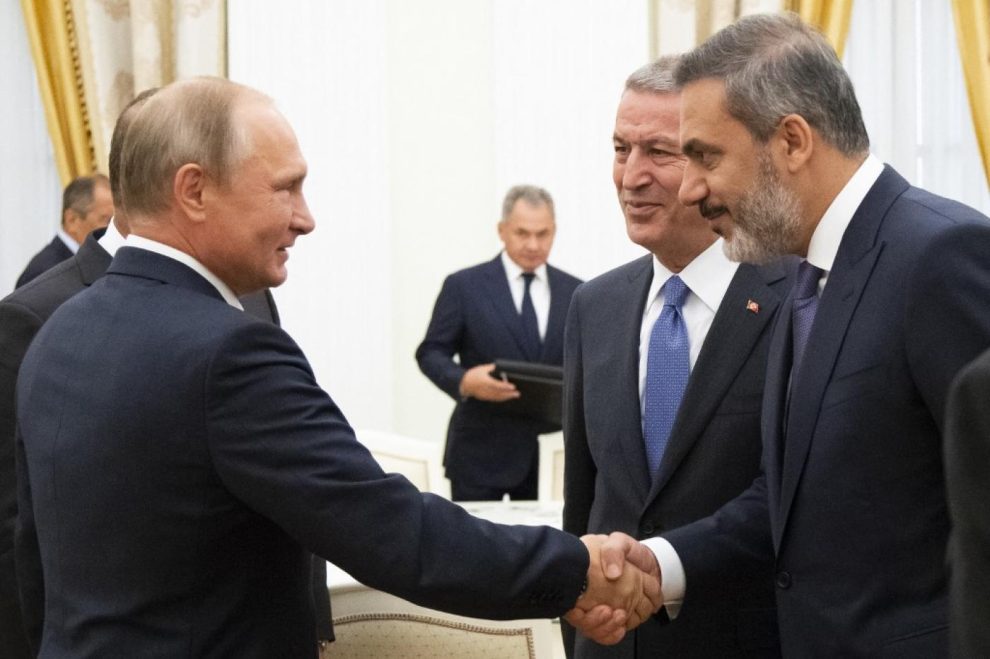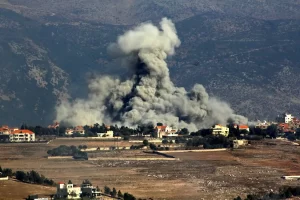A senior Turkish official tells MEE that Turkey reiterated concerns over ‘terrorist’ groups and called parties to facilitate return of refugees under UN watch.
A senior Turkish official has denied that Turkey had discussed the withdrawal of its troops from Syria in the latest round of talks between Iran, Russia, Syria and Turkey’s defence and intelligence chiefs in Moscow on Tuesday.
The Syrian defence ministry said the talks discussed the withdrawal of Turkish troops from Syria alongside the opening of the strategic M4 highway, which paves the way for the revival of Syria’s trade with neighbouring countries.
The Syrian and Turkish defence ministers previously held talks in Moscow in December, marking the highest-level encounter between the two countries since the war began.
Nato alliance member Turkey has backed political and armed opposition to Syrian President Bashar al-Assad during the 12-year civil war, and sent its own troops into the north of the country.
“Turkey has never negotiated an issue regarding the withdrawal of its forces from Syria during the talks in Moscow,” the senior official told Middle East Eye. “We have discussed possible joint means of fighting against the Syrian arm of PKK and its armed wing, YPG.”
The official said that any Syrian message claiming otherwise is an attitude that goes against the constructive role of the Turkish government in the talks.
The Kurdistan Workers’ Party (PKK), a Kurdish separatist group, has waged a conflict against the Turkish state since the 1980s, involving violence that has killed tens of thousands of people.
Turkey, the US and the EU have designated the PKK a terror group due to the deadly attacks it has carried out on civilians. Turkey also views Kurdish armed groups in Syria as an extension of the group.
Return of refugees
The official added that the second topic discussed in the talks was the return of Syrian refugees.
“Turkey has called for the activation of the political resolution process under United Nations overview and to facilitate honourable and voluntary return of refugees back to their country in a secure way,” the official said.
“Turkey reiterated its previous arguments which were laid out in the past four meetings in Moscow. The condition of the Turkish army’s withdrawal from Syria would be with the end of the YPG threat and that the regime and its allies should contribute to the resolution.”
Omer Ozkizilcik, an independent foreign policy expert specialising in Syrian affairs, told MEE that the Syrian regime was expecting the result of Turkish elections to move the discussions forward regardless of the winner.
Turkish citizens will vote in presidential and parliamentary elections on 14 May, and the presence of 3.7 million Syrian refugees in the country is a major campaign issue.
“Every political party running in the elections has promised to normalise Turkey’s relations with the Assad regime,” Ozkizilcik said. “Damascus doesn’t want to give an electoral gift to Erdogan by agreeing a deal on refugees before the vote.”
Ozkicilcik added that the Assad regime had been dragging talks and making statements that contradict Ankara, to project itself as the stronger party in the negotiations.
“We have reiterated our concerns regarding the presence of terrorist groups and irregular militia in Syria,” the Turkish official said. “The return of Syrian refugees must be under the inspection and control of the UN.”
Turkey’s foreign minister said last week that a meeting of foreign ministers of the four countries, intended to build on the December talks, may take place in early May. However, he later said it was postponed because the parties could not agree on an exact date.
Syrian officials have said repeatedly that any moves towards normalising ties between Damascus and Ankara can only come after Turkey agrees to pull out thousands of troops it has stationed in the rebel-held northwest.
Turkey’s extensive military presence has prevented previous Russian-led military campaigns from returning the last major rebel-held enclave in Syria back to state control.
Source: Middle East Eye






































